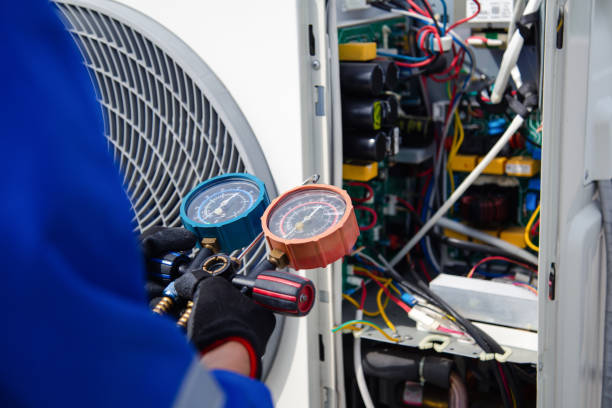
Proactive HVAC maintenance in Virginia Beach, VA is crucial for ensuring your comfort system runs reliably and efficiently year-round. Regular tune-ups extend its lifespan, significantly improve energy efficiency to lower utility bills, and prevent costly, inconvenient breakdowns. Our comprehensive service addresses coastal climate challenges, enhances indoor air quality, and helps maintain your manufacturer's warranty. This essential service transforms your HVAC unit into a dependable comfort source, protecting your investment from wear and tear.
Expert HVAC Maintenance in Virginia Beach, VA
Your home’s heating and cooling system works tirelessly to keep you comfortable through Virginia Beach’s hot, humid summers and chilly winters. This constant operation leads to natural wear and tear, a gradual decline in efficiency, and an increased risk of unexpected breakdowns. Proactive HVAC maintenance is the single most effective way to protect your investment, ensuring your system runs reliably and efficiently all year long. It transforms your HVAC unit from a potential liability into a dependable source of comfort, preventing minor issues from escalating into costly emergency repairs.
Why HVAC Maintenance is Essential for Your Virginia Beach Home
The unique coastal climate of Virginia Beach, characterized by high humidity and salt-laden air, places significant stress on HVAC systems. Regular, professional maintenance is not just a recommendation; it's a crucial service that addresses these local challenges head-on.
Extend Your System's Lifespan
An HVAC system is a major home investment. Just like a car, it requires routine service to perform at its best for years to come. During maintenance, technicians clean, lubricate, and tighten components, reducing the strain and friction that cause parts to fail prematurely. A well-maintained system can last years longer than a neglected one.
Improve Energy Efficiency and Lower Utility Bills
Over time, dirt and debris accumulate on coils, fans, and filters, forcing your system to work harder to heat or cool your home. This extra effort consumes more energy, leading to noticeably higher electricity bills. A professional tune-up restores your system to factory specifications, maximizing its efficiency and minimizing its energy consumption.
Prevent Costly and Inconvenient Breakdowns
The most common time for an AC to fail is during the peak of a summer heatwave, and for a furnace to quit is on the coldest night of the year. Preventative maintenance allows our technicians to identify and address potential problems, like worn-out capacitors or frayed wiring, before they cause a complete system failure. This proactive approach saves you from the stress, discomfort, and high cost of emergency service calls.
Enhance Indoor Air Quality
Your HVAC system circulates all the air in your home multiple times a day. If the system is dirty, it can distribute dust, allergens, mold spores, and other pollutants. Our maintenance service includes cleaning key components and inspecting your air filtration system, which contributes to healthier, cleaner air for your family to breathe.
Maintain Your Manufacturer's Warranty
Most HVAC manufacturers require proof of annual professional maintenance to keep the warranty on your system valid. Skipping tune-ups could leave you responsible for the full cost of a major component failure that would have otherwise been covered.
What Our Comprehensive HVAC Tune-Up Includes
We perform a detailed, multi-point inspection and tune-up to ensure every aspect of your system is in optimal condition. Our service is split into two seasonal visits to prepare your equipment for the demands ahead.
AC System Maintenance Checklist (Spring/Summer Tune-Up)
- Condenser Coil Cleaning: We thoroughly clean the outdoor condenser coil to ensure proper heat transfer and efficiency.
- Refrigerant Level Check: We measure refrigerant levels to ensure they meet manufacturer specifications, preventing poor cooling and component damage.
- Electrical Inspection: All electrical connections, capacitors, and relays are inspected and tightened to prevent system failure and ensure safe operation.
- Condensate Drain Line Flush: We clear the condensate drain line of any clogs or blockages to prevent water damage and system shutdowns.
- Blower Motor and Wheel Inspection: We inspect the blower components that are critical for proper airflow throughout your home.
- Lubrication of Moving Parts: All moving parts are lubricated to reduce friction and wear.
- Thermostat Calibration: We test and calibrate your thermostat for accurate temperature readings and control.
- Air Filter Inspection: We inspect your air filter and advise on the proper replacement schedule for your home.
- Overall System Performance Test: We run the system through a full cycle to verify it is cooling effectively and efficiently.
Heating System Maintenance Checklist (Fall/Winter Tune-Up)
- Heat Exchanger Inspection: For furnaces, we perform a critical safety inspection of the heat exchanger for cracks or corrosion that could lead to carbon monoxide leaks.
- Burner and Ignition System Cleaning: We clean and inspect the burners and ignition system to ensure reliable and safe operation.
- Gas Pressure and Flame Sensor Check: We test the gas pressure and clean the flame sensor to ensure efficient fuel combustion and prevent shutdowns.
- Safety Control Test: All safety controls and limit switches are tested to verify they are functioning correctly.
- Heat Pump Component Check: For heat pump systems, we inspect the reversing valve, defrost controls, and auxiliary heat elements.
- Flue and Venting Inspection: We ensure the system's exhaust pathway is clear and free of obstructions for safe ventilation.
- Complete System Cycling: We cycle the heating system to confirm it produces adequate heat and operates according to its design.
Signs Your HVAC System Needs Professional Attention
Even with regular care, it's important to be aware of warning signs. If you notice any of the following, your system is likely due for a professional inspection:
- Unusual Noises: Grinding, squealing, or clanking sounds indicate mechanical problems.
- Strange Odors: Musty smells can suggest mold growth, while burning odors may point to electrical issues.
- Weak Airflow: Reduced airflow from your vents is a common sign of a blockage or a failing blower motor.
- Rising Energy Bills: A sudden, unexplained increase in your utility costs often means your system has lost efficiency.
- Inconsistent Temperatures: If some rooms are too hot while others are too cold, your system may be unbalanced or struggling.
- Constant Cycling: A system that turns on and off too frequently is a sign of an underlying issue.









